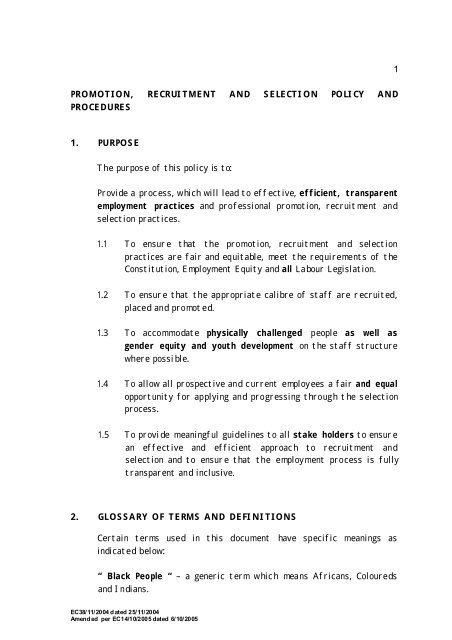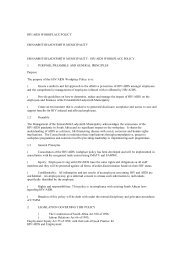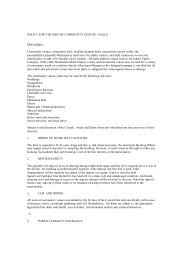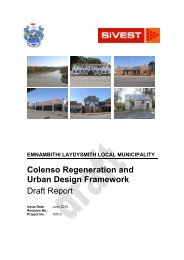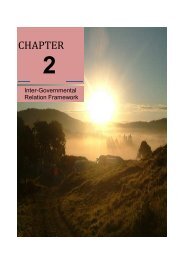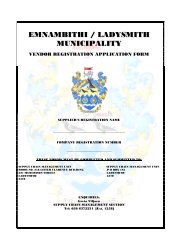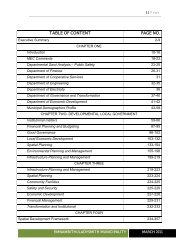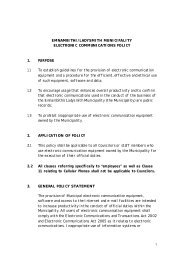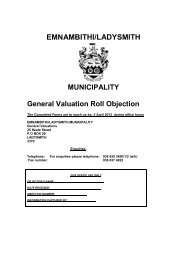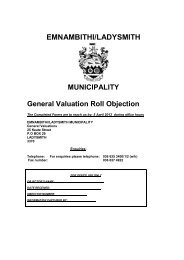Promotion, Recruitment and Selection Policy and Procedures
Promotion, Recruitment and Selection Policy and Procedures
Promotion, Recruitment and Selection Policy and Procedures
You also want an ePaper? Increase the reach of your titles
YUMPU automatically turns print PDFs into web optimized ePapers that Google loves.
1PROMOTION, RECRUITMENT AND SELECTION POLICY ANDPROCEDURES1. PURPOSEThe purpose of this policy is to:Provide a process, which will lead to effective, efficient, transparentemployment practices <strong>and</strong> professional promotion, recruitment <strong>and</strong>selection practices.1.1 To ensure that the promotion, recruitment <strong>and</strong> selectionpractices are fair <strong>and</strong> equitable, meet the requirements of theConstitution, Employment Equity <strong>and</strong> all Labour Legislation.1.2 To ensur e that the appropriate calibre of staff are r ecruited,placed <strong>and</strong> promoted.1.3 To accommodate physically challenged people as well asgender equity <strong>and</strong> youth development on the staff structurewhere possi ble.1.4 To allow all prospective <strong>and</strong> current employees a fair <strong>and</strong> equalopportunity for applying <strong>and</strong> progressing through the selectionprocess.1.5 To provide meaningful guidelines to all stake holders to ensurean effective <strong>and</strong> efficient approach to recruitment <strong>and</strong>selection <strong>and</strong> to ensure that the employment process is fullytransparent <strong>and</strong> inclusive.2. GLOSSARY OF TERMS AND DEFINITIONSCertain terms used in this document have specific meanings asindicated below:“ Black People “ – a generic term which means Africans, Coloureds<strong>and</strong> Indians.EC38/ 11/ 2004 d ated 25/ 11/ 2004Amend ed per EC14/10/2005 dated 6/ 10/ 2005
2“ Designated Groups “ – black people, women of all races <strong>and</strong> peoplewith disabilities.“ Employee “ – any person other than an independent contractor who –2.1 has a contractual relationship with the Municipality <strong>and</strong> whoreceives, or is entitled to receive any remuneration; <strong>and</strong>2.2 in any manner assists in carrying on or conducting the businessof the employer; but excludes any person employed in terms ofthe Job Creation <strong>Policy</strong>“ Inherent job requirement “ – the true job requirements that aregenuinely necessary for the competent perfor mance of t he jobincluding competencies in terms of any legal requirement.“ Job description “ – a job description detailing the expected duties<strong>and</strong> responsibilities of a job, indicating minimum experience, expertise<strong>and</strong> skills required of the incumbent used to grade the job.“ Job specification “ – a document, used in recruitment <strong>and</strong> selection,which profiles the requirements for a job, such as qualifications,skills, experience, physical <strong>and</strong> mental requirements <strong>and</strong> behaviours. Italso sets out personality/behavioural dimensions required forsuccessful fulfilment of job requirements, i.e. flexibility, ability towork under pressure, initiative <strong>and</strong> integrity.“ <strong>Selection</strong> criteria “ – the job requirements on which basis ac<strong>and</strong>idate will be selected, as indicated in the job specification.“ Merit “ - the capacity to do t he job, judged on, experience,knowledge, potential <strong>and</strong>/or demonstrated ability or qualifications.Emphasis should be on meeting the inherent requirements for the job<strong>and</strong> not necessarily appointing the highest academically qualifiedc<strong>and</strong>idate.“Potential” – the measure to which an applicant complies with theinherent requirements of a post by means of assessed ordemonstrated ability.“Relevant Legislation” – means the Constitution of the Republic ofSouth Africa, Labour Relations Act, Basic Conditions of E mploymentEC38/ 11/ 2004 d ated 25/ 11/ 2004Amend ed per EC14/10/2005 dated 6/ 10/ 2005
3Act, Employment Equity Act, Skills Development Act, MunicipalSystems Act <strong>and</strong> any other act or document that has any bearing onlabour relations.“Internal C<strong>and</strong>idate” – shall mean any person who is presentlyemployed by the Emnambithi/Ladysmith Municipality in a permanentcapacity, <strong>and</strong> a limited contract worker or a fixed term contractworker.“External C<strong>and</strong>idate” – shall mean anybody who does not comply withthe definition of “internal c<strong>and</strong>idate”.3. PROMOTIONPREAMBLEAny progressive institution should make sufficient provision for thesatisfactory promotion of personnel to higher positions. Opportunityfor promotion to higher positions within an organisation givespersonnel an opportunity to fully utilise their abilities <strong>and</strong> thereforeserves as a basis for motivation.<strong>Promotion</strong> implies "..an upward change of position normally involvinggreater responsibility <strong>and</strong> different duties from t hose of the pr esentposition."<strong>Promotion</strong> therefor e means that transfer of personnel member toanother position with higher grading, other title, more responsibility<strong>and</strong> higher salary.It must be stressed that promotion is not goal in itself, but a meansof placing competent <strong>and</strong> suitable personnel in high positions. Animportant consideration when promoting personnel is whether thechoice of c<strong>and</strong>idates for promotion are restricted to personnelalready in the employ (i.e. a 'closed' personnel system) <strong>and</strong> whethercompetent c<strong>and</strong>idat es from outside t he organisation should beconsidered (i.e. an open personnel system). A closed personnel systemcan promot e the morale of the members but does not necessarilyalways ensure t hat the most effective services are rendered. Aclosed personnel system in fact implies that the relevant institutionor organisation should provi de training <strong>and</strong> development programmesEC38/ 11/ 2004 d ated 25/ 11/ 2004Amend ed per EC14/10/2005 dated 6/ 10/ 2005
4to personnel so that they may pr epare t hemselves for higherpositions. In addition, promotion shoul d take place according tocertain criteria:Criteria for promotionCertain criteria for promotion are essential as "It has been consistentexperience that people are underst<strong>and</strong>ing about t hese closedsituations as long as they trust the fairness of the promotion system- <strong>and</strong> the fairness <strong>and</strong> objectivity of their managers."The criteria for promotion shoul d therefor e be objective <strong>and</strong> serve toassist in ensuring the right person is promoted to the right position.Criteria that may serve as a basis for deciding on the promotability ofpersonnel include:SENIORITY refers to age <strong>and</strong> experience. This is a relative conceptunless it is specifically indicated how long an individual should hold acertain position before he/she may be promoted to a higher position.EDUCATIONAL QUALIFICATIONS which are generally aprerequisite for a particular job. In fact, particular qualifications areessential for certain municipal functions. Meritorious personnelshoul d therefore be offered opportunity to acquire the necessaryqualifications for the higher positions.CHARACTER which implies that personality <strong>and</strong> attitude of anemployee or c<strong>and</strong>idate should be assessed. This is referred withinthe Public Service as responsibility <strong>and</strong> human relations.ABILITY TO DO THE WORK which is regarded as a significantcriterion for promotion. This is nevertheless a difficult matter toassess. Nor mally work achievement in the present position isassessed, although this only supplies an indication of possibleachievement in a higher position. Issues like organisation <strong>and</strong>productivity <strong>and</strong> latent potential needs to be assessed which can beused to assess whether an employee has the ability <strong>and</strong> capacity to dothe job.MERIT which is rather the end result of all the preceding criteriathan a characteristic in itself. 'Merit' refers in fact to the c<strong>and</strong>idatewho will give the best perfor mance in a higher position.EC38/ 11/ 2004 d ated 25/ 11/ 2004Amend ed per EC14/10/2005 dated 6/ 10/ 2005
5Duty of ManagersThe primary duty of a manager is to identify, mentor <strong>and</strong> nurturethose employees who exhi bit a potential to work, show efficiency,display a sound wor k ethic <strong>and</strong> is productive in the workplace.Provide a programme of in-service training <strong>and</strong> development byexposing t he employees to a variety of work stimuli like mentorship,workshops, work orientation, proficiency training <strong>and</strong> exposure toadditional challenges <strong>and</strong> work experience.Take note of the i mportance of the principle of recognition of PriorLearning (RPL), <strong>and</strong> expose employees to some form of assessment <strong>and</strong>benchmark accreditation.Encourage employees to study further through institutions of higherlearning, technikons <strong>and</strong> universities <strong>and</strong> technical centres byaccessing bursaries <strong>and</strong> study loans.Motivating entry level employees <strong>and</strong> aligning them to learnersprogramme available through the various Setas.Informing everyone of t he contents of the policy document onpromotion, <strong>and</strong> committing oneself in its implementation in a fair,transparent <strong>and</strong> just manner, noting all the criteria listed above.Duty of EmployeesEmployees need to underst<strong>and</strong> that individuals who render exceptionalservice will receive exceptionally high compensation for such services.Those with little or no specialised training will, on the other h<strong>and</strong>,have to work for lower compensation.There should be commitment to training <strong>and</strong> personnel development,<strong>and</strong> accessing the requisite benchmark qualifications for upwardmobility.Be enthusiastic <strong>and</strong> determined to succeed, be productive <strong>and</strong> loyal tothe municipal environment, <strong>and</strong> display the willingness to go t he extramile in the execution of work duties.EC38/ 11/ 2004 d ated 25/ 11/ 2004Amend ed per EC14/10/2005 dated 6/ 10/ 2005
6BROAD PRINCIPLESThe promotion policy of this municipality must be aligned to t heprinciple of dealing with r edress <strong>and</strong> the inequities of the past, <strong>and</strong>should subscribe to the provisions of the Employment Equity Act,1998.<strong>Promotion</strong> shoul d be seen as a mechanism to elevate employees to ahigher work level through a negotiated process rather than arecognition for favour, friendship or any other issue of nepotism.Both managers <strong>and</strong> employees need to recognise <strong>and</strong> acknowledge thatthis policy can provide the necessary stimulation, motivation <strong>and</strong>morale to everyone in the organisation.4. GUIDING PRINCIPLES FOR PROMOTION, RECRUITMENT ANDSELECTION PROCEDUREThe guiding principles that underpin this policy are intended to assistall responsible parties involved in implementing promotion, recruitment<strong>and</strong> selection <strong>and</strong> include:4.1 EffectivenessThe central guiding principle for promotion, recruitment <strong>and</strong> selectionis to select c<strong>and</strong>i dates who best meet the inherent requirements ofthe job.A key principle of this policy is to develop existing employees to fulfilthe future human resource requirements through identifying trainingneeds, agreeing to career pat hs <strong>and</strong> training in jobs relating to themunicipal environment.It is therefor e acknowledged that the development <strong>and</strong> promotionfrom within is a key focus of the approach of theEmnambithi/Ladysmith Municipality to effective recruitment <strong>and</strong>selection.EC38/ 11/ 2004 d ated 25/ 11/ 2004Amend ed per EC14/10/2005 dated 6/ 10/ 2005
4.2 Efficiency <strong>and</strong> professionalism7Persons involved in the selection process are obliged to maintain highlevels of professionalism, integrity <strong>and</strong> confi dentiality.4.3 Compliance with legislation<strong>Recruitment</strong> <strong>and</strong> selection practices must comply with requirementscontained in all relevant legislation inclusive of but not limited to theLabour Relations Act, Employment Equity Act <strong>and</strong> the Basic Conditionsof Employment Act <strong>and</strong> the Occupational Health <strong>and</strong> Safety Actprovided it is not in conflict with the South African Constitution.4.4 Acts of direct unfair discriminationBarring persons from being considered for employment on grounds ofrace, ethnicity, gender, language, religious conviction disability, sexualprefer ence, criminal recor d or disadvantaged background, exceptwhere job requirements <strong>and</strong>/or legislation necessitate.4.5 Acts of indirect unfair discriminationSetting unrealistic job entry requirements, person profiles orqualification requirements.Job entry requirements will be reassessed in consultation withrelevant stake holders on an on-going basis to ensure that they areappropriate <strong>and</strong> clearly stipulate what are deemed to be essentialrequirements for the job.Vacant posts will be analysed to determine realistic person <strong>and</strong> postrequirements in respect of all posts.5.1 PROMOTION PROCEDURE AND INTERNAL RECRUITMENTPROCEDUREShould there be a vacant or new position t he route of internalpromotion must only be followed if the Head of Department inconsultation with labour representatives is of the opinion thatqualifying c<strong>and</strong>idate or c<strong>and</strong>i dates are available for the position.EC38/ 11/ 2004 d ated 25/ 11/ 2004Amend ed per EC14/10/2005 dated 6/ 10/ 2005
The following procedure must be followed when internal promotion isconsidered:85.1.1 The Head of Department must obtain the permission of theMunicipal Manager to advertise the post <strong>and</strong> t hereaftercompile an advertisement in consultation with labourrepresentatives detailing the job specification.5.1.2 Copies of t he advertisement must be placed on all depart ments’notice boards for a period of one (1) week. A copy of theadvertisement should also be made available to the Manager:Corporate Services.5.1.3 The advertisement must clearly state the specific selectioncriteria, time limits <strong>and</strong> procedures for application.5.1.4 Heads of Departments must not approach individuals they haveidentified as suitable for a particular position prior to followingthis procedure.5.1.5 After the closing date for applications, the particulars of allapplicants must be entered onto a schedule unless it requireshuge administrative intervention in which case practicalalternative arrangements must be agreed upon by the selectionpanel.5.1.6 The Municipal Manager or his nominee shall arrange for aCommittee consisting of the Manager : Corporate Services orhis nominee, the relevant Head of Department <strong>and</strong> a maxi mumof two representatives from each Union to discuss whetherpolicy <strong>and</strong> procedur e had been adher ed to <strong>and</strong> whet her t herecommendation for promotion of an employee is fair in termsof all applicable legislative requirements <strong>and</strong> policy.5.1.7 It will not be necessary to interview all or any of the internalapplicants provide all stakeholders are in agreement withthat process. If it is necessary to interview c<strong>and</strong>idate, thesame procedure for interviewing external applicants shall apply.5.1.8 The schedule <strong>and</strong> the name of the most suitable c<strong>and</strong>idateshould be forwarded to the Municipal Manager together withEC38/ 11/ 2004 d ated 25/ 11/ 2004Amend ed per EC14/10/2005 dated 6/ 10/ 2005
9the motivation of the Head of Department after consultationwith the Unions in respect of a c<strong>and</strong>idate’s suitability forappointment. The Municipal Manager will then consi der therecommended promotion of the employee <strong>and</strong> if satisfiedapprove t he promotion of the employee into the vacant position.5.1.9 All the necessary documentation pertaining to the promotion ofthe employee must be complet ed by t he Hea d of Depart ment<strong>and</strong> forwarded to the Manager: Corporate Services who willexecute the process of the appointment further.5.1.10 An employee or union repr esentative will have three (3) workingdays in which to lodge a dispute in the normal way through thegrievance procedur e. They must motivate the reason(s) fortheir dissatisfaction with the choice of applicant or with thefailure of management to make any appointment.The grievance will be heard by the Municipal Manager or an AdhocCommittee appointed by the Municipal Manager withinseven (7) days unless reasonable circumstances exist to extendthe time.Should the employee or union representative still bedissatisfied, a dispute may be declared within three (3) workingdays <strong>and</strong> referred to Council.If the dispute remains unresolved after being referred toCouncil, the Unions may refer the matter to the BargainingCouncil.6. EXTERNAL RECRUITMENT AND SELECTION PROCEDURES6.1 EMPLOYMENT STATUSEmployees may be recruited into one of the following categories:6.1.1 Permanent employmentPosts that have been designated by Council to be filled byemployees on a permanent basis for an undefined period.6.1.2 Contract employmentEC38/ 11/ 2004 d ated 25/ 11/ 2004Amend ed per EC14/10/2005 dated 6/ 10/ 2005
10Posts that have been designated by Council to be filled on afixed term contract for a specified period.6.1.3 Skills Development C<strong>and</strong>idatesSkills Development C<strong>and</strong>i dates include Interns, Cadets <strong>and</strong>Learnerships.6.2 RECRUITMENT AND SELECTION PROCEDUREExternal sourcing of c<strong>and</strong>idates should only be considered once theinternal process has been exhausted <strong>and</strong> no qualifying c<strong>and</strong>idate foundor based on a legal or operational requirement. That under specialcircumstances where such expertise does not exist internally,Council may advertise externally.6.2.1 General PrinciplesAttempts will be made to appoint applicants from designatedgroups to vacant posts while supporting the merit principlesubject to the following:6.2.1.1 Affirmative Action appoint ments will apply in thosejob cat egories where designat ed groups are notfairly represented as stipulated in the approvedemployment equity plan.6.2.1.2 Members of designated groups will receiveprefer ence above others, all things being equal, inthose job cat egories where Affirmative Actionapplies.6.2.1.3 Relevant experience, recognition of prior learning<strong>and</strong> length of service shall be taken into accountwhere for mal qualifications are absent whilst theinherent <strong>and</strong> legal requirements of the post shallprevail above all.6.3. ADVERTISING VACANT POSITIONS6.3.1 Permanent <strong>and</strong> Contract EmployeesEC38/ 11/ 2004 d ated 25/ 11/ 2004Amend ed per EC14/10/2005 dated 6/ 10/ 2005
11All advertisements shall clearly state all the relevant jobrequirements, application procedures, together with time limits <strong>and</strong>confirm that the Emnambithi/Ladysmith Municipality subscribes to anEqual Employment Practice <strong>and</strong> Affirmative Action Programme, whichis non-racist, non-sexist, non-discriminatory <strong>and</strong> based on merit.The format of the application form should be simple, based on jobrelated information <strong>and</strong> the advertisement shall be placed in English inlocal newspapers <strong>and</strong> in isiZulu, English <strong>and</strong> Afrikaans on all noticeboards.Advertisements will be placed in local newspaper first to targetbona fide residents from the E mnambithi/Ladysmith Municipal area,firstly, where skills shortages exist, ther eafter adverts may beplaced Provincially <strong>and</strong> thereafter Nationally. Non-South Africancitizens may be considered only under special circumstances <strong>and</strong> onagreements with the registered trade unions after prior approval ofthe Municipal Manager has been obtain to consider such c<strong>and</strong>idates.The Municipality may, in addition to newspapers traditionally used,also place such advertisements in other appropriate publications.Advertisements for General Workers will be placed monthly on allCouncil <strong>and</strong> community venues notice boards <strong>and</strong> not be advertised inthe press <strong>and</strong> Heads of Departments will shortlist from applicationsreceived as stipulated in clause 7.All advertisements must state the closing date <strong>and</strong> time ofapplications <strong>and</strong> this date must be adhered to at all times.All advertisements shoul d contain the following additional paragraph:“If you have not been contacted within 30 days after theclosing date, please accept that your application wasunsuccessful.”All applicants will be required to provide the Emnambithi/LadysmithMunicipality with up front consent to verify their reportedqualifications with the institution where such qualifications wereobtained.EC38/ 11/ 2004 d ated 25/ 11/ 2004Amend ed per EC14/10/2005 dated 6/ 10/ 2005
7. SHORT-LISTING127.1 Permanent or Contract EmployeesThe Departmental Head, Chief Personnel Services or t heir nominees<strong>and</strong> a maxi mum of two Representatives from each Union will processthose applicants to be placed on the short-list in terms of the criterialaid down by the Departmental Head. At no stage must it be allowedfor any party to delay the process due to representatives being lateor not present. The shortlist should be signed by all parties.A profile of each c<strong>and</strong>i date on t he shortlist must be compiled, <strong>and</strong> t hesummary sheets of all relevant facts must be checked by thePersonnel Services before each interview to ensure that informationis correct.All qualifications listed by individuals on the shortlist must becontained in the summary compiled, <strong>and</strong> not only those directlyrequired by the job, as all qualifications are considered as havingvalue.The Manager: Corporate Services shall be responsible to verify eachqualification reported on all short listed c<strong>and</strong>idates’ applications. Anyapplicant who has reported to be in possession of an unverifiablequalification shall be excluded from any further process whatsoever.The Chief Personnel Services will submit the list of short listedc<strong>and</strong>idates / applicants to the Interview Panel on the day of theinterview.No further additions of names of c<strong>and</strong>idates are allowed after theshort listing process.8. INTERVIEWS8.1 Permanent or Contract EmployeesAfter short listing, the Chief Personnel Services should afterconsultation with the Departmental Head, arrange for a date forinterviewing of c<strong>and</strong>idates within 14 to 21 days.EC38/ 11/ 2004 d ated 25/ 11/ 2004Amend ed per EC14/10/2005 dated 6/ 10/ 2005
13An interview panel should be established comprising of the Head ofDepartment <strong>and</strong>/or representative, Manager: Corporate Services orhis representative (who will act as Chairperson) <strong>and</strong> a maximum of tworepresentatives from each union who will act as observers.Before the interview, the relevant Head of Department must submit alist of at least ten (10) competency based interview questions to theManager: Corporate Services who will then select five (5) questions tobe used during the interview. These questions must be keptconfidential.During the interview, the interview panel is responsible for ensuringthat all applicants are given an opportunity to ask questions in respectof the job requirements, the conditions of employment associatedwith the job, <strong>and</strong> career prospects that may stem from employmentwith the Municipality.All members of t he interview panel are required to abide by t heprinciples contained in this Agreement, <strong>and</strong> each member of theinterview panel shall undertake their duties with integrity <strong>and</strong>confidentiality.Any member of the interview panel is required to recusethemselves from the interview panel should they have a personalinterest or bias in regard to any of the applicants. If a disputearises in this regard, the decision of the Municipal Manager willbe final.The interview panel is responsible for ensuring that the interview isstructured by use of consistent questioning techniques acrossinterviews, with questions related to the requirements <strong>and</strong> dimensionsof the job. While questions should be consistent across interviews,this shall not prevent interviewers from probing applicants withsupplementary questions.The interview panel is responsible for creating an atmosphere toconduct the interviews in a professional manner.An appropriate record shall be kept of all interviews to confirm thatthe interview panel have complied with the requirements listed above.9. RECOMMENDING AN APPLICANT FOR APPOINTMENTEC38/ 11/ 2004 d ated 25/ 11/ 2004Amend ed per EC14/10/2005 dated 6/ 10/ 2005
9.1 Permanent or Contract Employees14The following should be used as guiding principles for recommendationof an applicant for appointment by the Municipal Manager:9.1.1 Prefer ence will be given to applicants from designatedgroups in those cat egories wher e designated groups are notfairly represent ed.9.1.2 Qualifications unrelated to the job <strong>and</strong> unnecessary highqualification requirements shall not be used to justifyplacement of persons from advantaged groups over thosefrom disadvantaged groups nor may such placement bejustified on the grounds of seniority of an advantagedperson.9.1.3 Unless formal qualifications are clearly justified asessential requirements for the job, relevantexperience/perfor mance training (internal or external) <strong>and</strong>potential for the prospective vacancy shall be importantcriteria.9.1.4 The placement criteria shall be objective <strong>and</strong> related to theinherent requirements of the job <strong>and</strong> the realistic futureneeds of the Municipality. The aforementioned criteriashall be consistently applied to the placement of all theapplicants.9.1.5 The placement criteria should be a measurable <strong>and</strong>subjective judgement of an applicant’s capability <strong>and</strong>potential should be kept to a minimum wher ever practicable.9.1.6 Canvassing by job applicants, or any other person onbehalf of job applicants, for posts within the Council’sservice is prohibited <strong>and</strong> evidence thereof will disqualifythe applicant’s application for consideration forappointment.9.1.7 The Interview Panel must make the final decision based onan overall assessment taking into account:-EC38/ 11/ 2004 d ated 25/ 11/ 2004Amend ed per EC14/10/2005 dated 6/ 10/ 2005
15- The competencies required <strong>and</strong> assessment of anapplicant in meeting the requirements.;- The requirement of that particular department, divisionor section to meet the need of matching their employeecomponent with that of the labour market inEmnambithi/Ladysmith Municipal are in order to achievea more representative work force with respect to race<strong>and</strong> gender;- The recommendations of the panellists <strong>and</strong> unionobservers;9.1.8 The Interview Panel’s decision must be conveyed in writingduly endorsed by the panel to the Municipal Manager whois the only person allowed in terms of the Systems Act toconfirm appointments.9.1.9 Should the Interview Panel decide not to make anappointment due to the lack of a suitable applicant, theMunicipal Manager must be infor med ti meously <strong>and</strong> t heInterview Panel must motivate their decision.9.1.10 That subject to the dispute resolution being concludedthe post be re-advertised.10. APPOINTMENT OF STAFF ACTING IN POSITIONS10.1 That staff may only be appointed in acting positions inaccordance with the Conditions of Service.10.2 That acting appointments not exceed three (3) months.10.3 That acting appointments be made in consultation withunions.10.4 That letters of acting appointments be sent under thesignature of the Municipal Manager, stating that suchappointments should not create expectations to be appointedin the post upon advertisement of such post.EC38/ 11/ 2004 d ated 25/ 11/ 2004Amend ed per EC14/10/2005 dated 6/ 10/ 2005
1611. APPOINTMENT OF STAFF ASSOCIATED WITH THEADMINISTRATION OF THE MAYOR/DEPUTY MAYORThis policy shall not be applicable to the appointment of staffnecessary for the administration of the office of the Mayor orDeputy Mayor where selection will be done by the Mayor/D eputyMayor for the specific term of the Mayor/Deputy Mayor after therequest for the appoint ment was approved by the Municipal Manager.The appointment letter to state that an expectation to beappointed elsewhere in the municipality at the conclusion of theperiod should not be created.12. DISPUTE RESOLUTIONAn employee or union representative will have three (3) working daysin which to lodge a dispute in t he nor mal way t hrough the grievanceprocedure. They must motivate the reason(s) in writing on a specificproforma for their dissatisfaction with the choice of applicant orwith the failure of management to make any appointment.The grievance will be hear d by the Municipal Manager or an Ad-hocCommittee appointed by the Municipal Manager within seven (7) daysunless reasonable circumstances exist to extend the time.Should t he employee or union representative still be dissatisfied, adispute may be declared within three (3) working days <strong>and</strong> referredto Council.If the dispute remains unresolved after being referred to Council,the Unions may refer the matter to the Bargaining Council.13. APPLICABILITY OF PROCEDUREThe procedure shall be applicable to all recruitment, selection <strong>and</strong>placement of staff between salary levels 2 – 16. Those employees onsalary level 1 will be appointed by powers reserved to the Council,provided that the recommendation of the Municipal Manager must beobtained <strong>and</strong> considered before any appointment is made.EC38/ 11/ 2004 d ated 25/ 11/ 2004Amend ed per EC14/10/2005 dated 6/ 10/ 2005
14. INTERPRETATION AND AMENDMENT17The parties to this Agreement will negotiate any amendment to this<strong>Policy</strong>.EC38/ 11/ 2004 d ated 25/ 11/ 2004Amend ed per EC14/10/2005 dated 6/ 10/ 2005


